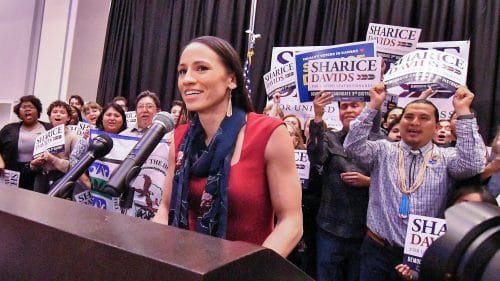America Has Rejected Trumpism
COMMENTARY

Make no mistake: America has rejected Trumpism.
No one seriously expected the Senate to flip, because Democrats had to defend 26 seats in that chamber, compared with only nine held by Republicans.
The real battleground was the House, where Democrats had to achieve a net gain of 23 seats to get the 218 needed for a majority.
They did.
Trump wasn’t on the ballot, but he made the election into a referendum on himself.
So Americans turned against House Republicans, who should have acted as a check on him but did nothing — in many cases magnifying his vileness.
The nation has repudiated Trump, but do not believe for a moment that our national nightmare is over.
Trump still occupies the White House and in all likelihood will be there for two more years. The Republican Party remains in control of the Senate.
Fox News is still Trump’s propaganda ministry. (The line between Fox and Trump, already blurred, vanished completely at his last pre-election rally when Fox hosts Sean Hannity and Jeannine Pirro joined him onstage.)
The American people will be subject to more of Trump’s lies and hate, as amplified by Senate Republicans and Fox News.
Trump can be expected to scapegoat House Democrats for anything that goes wrong. American politics will almost certainly become even meaner, coarser and uglier. We will remain deeply and angrily divided.
Most worrisome, America still won’t respond to real threats that continue to grow, which Trump and his enablers have worsened: climate change, the suppression of votes and foreign intrusions into our elections, the most expensive and least efficient health care system in the world, and, not least, widening inequalities of income, wealth and political power.
America will eventually overcome and reverse Trumpism. The harder challenge will be to reverse the reasons Trump and his Republican lapdogs gained power in the first place.
Some blame racism and nativism. But these toxins have poisoned America since the founding of the Republic. What’s new has been the interaction between them and the long economic slide of tens of millions of working Americans, most of them white and lacking college degrees.
They used to be the bedrock of the Democratic Party, many of them members of trade unions whose strength in numbers gave them an increasing share of the gains from economic growth. Their long economic slide has generated the kind of frustrations that demagogues throughout history have twisted into rage at “them.”
Meanwhile, most economic gains have gone to the top 1 percent, whose wealth is now greater than the combined wealth of the bottom 90 percent — giving them enough political muscle to demand and get tax cuts, Wall Street bailouts, corporate subsidies and regulatory rollbacks. These in turn have created even more wealth at the top.
These were all trends before Trump. Yet Democrats failed to reverse them, even though Democrats occupied the White House most of these years (and during four of them controlled both houses of Congress). Trump has worsened them by slashing taxes on the wealthy and corporations, whittling back the Affordable Care Act and loosening restrictions on Wall Street.
Jobs may be back, but they pay squat, especially compared with the rising costs of housing, health care and education. And they’re less secure than ever. One in five is now held by a worker under contract without any unemployment insurance, sick leave or retirement savings.
Which presumably is why Trump decided to focus the midterms on hate and fear rather than on the economy.
He thereby created a large opening for Democrats aiming for 2020. They can become the party of the bottom 90 percent by creating a multiracial, multiethnic coalition to wrest back control of our economy and democracy.
They would focus on two big things: First, raise the purchasing power of the bottom 90 percent through stronger unions, a larger wage subsidy (starting with a bigger earned income tax credit), and Medicare for all.
Second, get big money out of politics through public financing of elections, full disclosure of all sources of political funding, and an end to the revolving door between business and government.
Democrats shouldn’t try moving to the “center.” The center no longer exists because most Americans are no longer on the traditional “right” or “left.”
The vast majority of Americans are now antiestablishment, and understandably so.
The practical choice is either Trump’s authoritarian populism backed by the moneyed interests, or a new democratic populism backed by the rest of us.
The direction couldn’t be clearer. It is the Democrats’ hour.
—
Robert Reich’s latest book is “The Common Good,” and his newest documentary is “Saving Capitalism.”
—
© 2018 By Robert Reich; Distributed by Tribune Content Agency, LLC






















